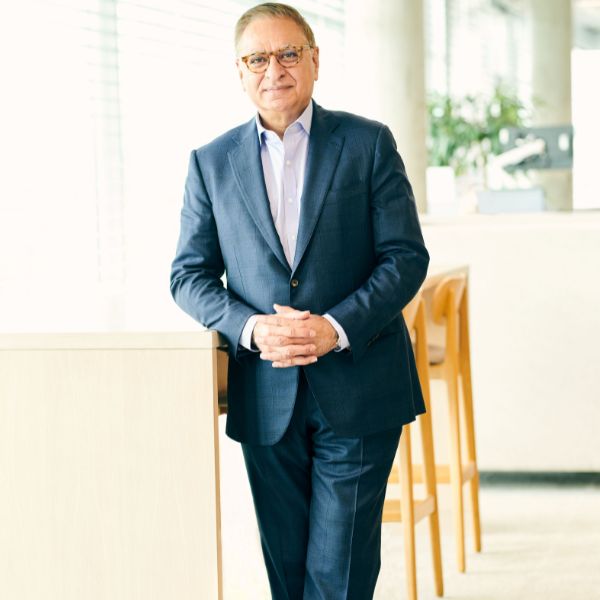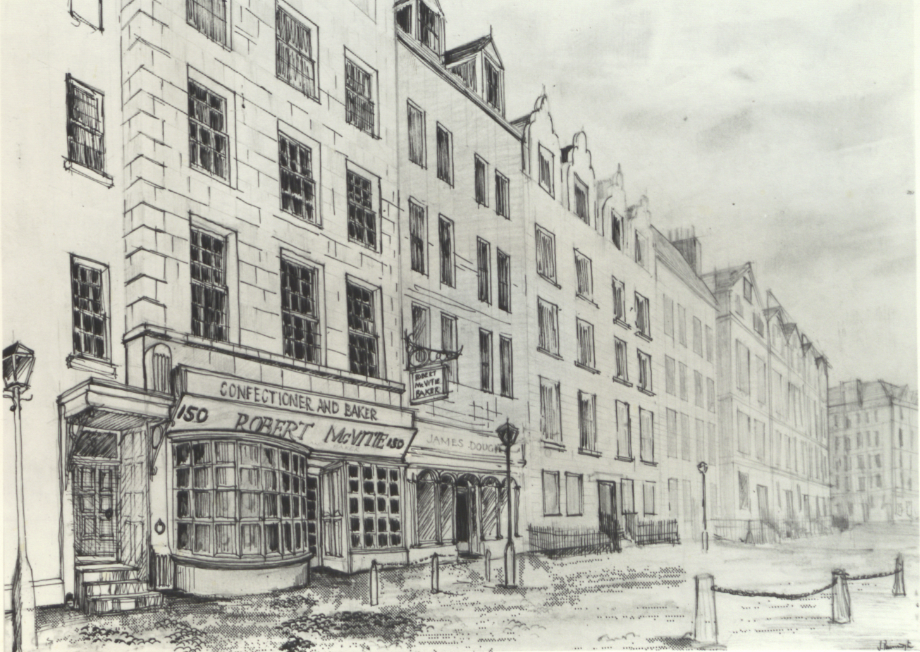In Conversation: Salman Amin
First published in the Brunswick Review – April 2024.
For a 2002 docuseries called In Search of America, ABC News followed Salman Amin, a rising PepsiCo star originally from Pakistan, as he and his young family became US citizens.
Twenty-two years later, ABC seems prescient in its choice of Amin as somebody to watch. Today he is CEO of pladis, owner of iconic chocolate and biscuit brands such as McVitie’s, Godiva, Turtles, Carr’s, Ülker, Verkade and Flipz. It’s a business whose stated purpose is to bring happiness with every bite.
Was this position—CEO—the goal all along? Amin laughs. “Absolutely not! When I was young I’m not sure I even knew what a CEO does.” In fact, even the prospect of entering business at all was a strange concept for the young man who was expected to follow in his father’s footsteps as an engineer.
“My father ran an engineering business in Pakistan, massive infrastructure projects—dams, nuclear power plants, that sort of thing. As a youngster I would visit his workplace and spend hours at a draughtsman’s desk learning to draw with technical instruments. This was in the days before computeraided design, and the required precision, attention to detail and focus fascinated me. It gave me a lifelong appreciation for sweating the details.”
After obtaining a degree in Civil Engineering from Syracuse University, Amin began his working life digging beneath the city of Chicago. Every day he was lowered deep underground in a metal cage, through a narrow bore hole, to check the integrity of concrete tunnels. “Not a job for the fainthearted. And while I didn’t know it at the time, I think the experience prepared me for taking risks. If something’s giving you a nervous feeling in the pit of your stomach, it might be worth trying.”
A self-confessed math nerd (“Seriously, I used to walk about with a calculator attached to my belt… cool I was not.”), a sudden realization about his potential future as an engineer set him on a different course in life. “I looked around and saw only incremental and anticipated steps forward. I felt I wanted something more exciting than that.”
“If something’s giving you a nervous feeling in the pit of your stomach, it might be worth trying.”
Breaking with family tradition posed something of a challenge. “We had some pretty tough conversations about it I can tell you. We were a traditional Pakistani family and certain things were just expected. But, at the same time, we were a loving family and I’m forever grateful that my parents supported my ambitions. What I wanted was contrary to what they thought was right. But they saw how strongly I felt about it. They listened and they understood.”
He settled on a career in investment banking where his passion for numbers would be put to the test. “During my MBA at Northwestern University’s Kellogg business school I was invited to interview for a marketing position with Procter & Gamble. I wasn’t interested in joining them, and even less in marketing, but thought it would be good interview practice for the job I really wanted with a bank.”
But something unexpected happened at the interview. “The interviewer saw very quickly that I knew nothing about marketing and asked why I was there. It was a question I could answer only honestly, so we just had a pleasant chat before parting company. I was astonished when P&G asked me back for the next round.”
Was it his honest approach that impressed them? “Perhaps. You can only be yourself, even in a world that’s always trying to make you something else. The one thing you have that no one else does is you.”
And during the process he discovered a new love: brands. Brands that he believed in, cared about and wanted others to love too. He forgot about banking and took the P&G job. He and his wife also agreed their immediatefuture was in the US. “If you’re going to compete in a discipline like marketing, you need to be among and learn from the very best. Equally important was the opportunity for my wife, Neelum, to progress her career in education. That’s why we chose to make the US our home. Our life together, our family, is a shared endeavor. It had to work for both of us. That principle hasn’t changed.”

By the time Amin was featured in ABC’s series, he’d marketed a range of consumer goods and had moved to leadership positions in beverages and snacks at PepsiCo, including being in charge of Lay’s, the potato chips megabrand. COO roles (US and then global) at SC Johnson followed before he was offered the top job at pladis to make his ultimate impact.
“I only had to look at pladis’ brands—many of which I knew well of course— to know I wanted the job. McVitie’s, Ülker, Carr’s, Flipz, Turtles… these brands have been bringing happiness to people around the world for generations. Who wouldn’t want to be part of that? I felt I could make a strong mark on this business, and I really wanted to go for it. I couldn’t wait to jump in!”
Amin’s inquisitiveness renders impossible a standard interview wherein he would field all the questions. During our time together, in fact, an almost comic confusion arises over who is interviewing whom. His interest in me seemed sincere and consequently it was charming. But was it a deflection technique?
“Not really. I believe leadership begins with a genuine interest in people, and I find the best way to understand them is by asking questions. I try to draw people out and lead them to find answers, rather than give them the answers. I was asked by one of my leadership team why I ask them so many questions and I replied, ‘because these are the questions you must ask yourself.’”
Nevertheless, Amin graciously answered several questions I put to him about himself and the transformation of pladis that he started five years ago.
You didn’t have a plan to become CEO… but did you have a plan for what you’d do as CEO?
I quickly realized there was so much more pladis could be. The company wasn’t making the best of its brands, its assets, its crown jewels. To be honest, some of them were in danger of losing their relevance. And the whole operation was too siloed with a lack of shared ambition, shared goals and collaboration.
The thing that really struck me? The people didn’t know each other. They weren’t a team. This was partly because pladis was formed a few years earlier by bringing existing businesses together. It was a collection of businesses under one name, but not truly integrated.
And people were introspective, not looking outward at the market, the competition and most importantly, consumers. But there was a huge amount of pent-up passion and potential. I knew I had to unleash that—and I knew I needed a plan. One that made us more outward facing, put consumers front and center, and that recognized the vital importance of our retail customers and the partners who get our brands into the hands of consumers—that their success is our success.
You could say my first day there was the beginning of a deliberate transformation for pladis.
The integration of luxury chocolatier GODIVA into pladis completes this year.

You’ve spoken of your fascination with precision. Was that important for the transformation strategy?
Yes and no. Of course, there are things we need to be obsessed with getting right—quality, performance and so on. But the most important thing for me is simplicity. There’s a real beauty in simplicity. Take marketing, when you get down to it, it’s not complicated. Can you find it? Do you want it? Do you want more of it? Really, those are the only three questions you need to answer.
And, after a pretty rapid diagnosis of pladis’ situation, we focused on four priorities that would form our strategy. As successful companies do, we knew these had to be simply and compellingly communicated so every employee would be able to feel part of our transformation journey: own the streets; make every penny count; innovate today to fuel tomorrow; and win as one pladis. Four strategic pillars that capture everything we’re aiming for.
You called this strategy “Compete to Win”. Competing, winning … these are important concepts for you, aren’t they?
In my younger days I was tennis mad, playing pretty much every day, so the idea of competing is deeply ingrained in me. Knowing you have to beat the other guy and to do that, you’ve always got to be at your best. I hope I’ve brought that to pladis and the way we think of ourselves now.
That’s not to say that competing and winning were alien concepts for pladis, but too often the focus was on beating what we did last year, without considering what the other guys out there were doing. That may feel good from one year to the next, but it’s not truly competing. Nobody shadow boxes their way to victory. In the long term, it’s self-defeating.
Owning the streets, making every penny count… these are about growth and margin. Can a softer, cultural priority like “winning as one pladis,” stand alongside these?
Absolutely! In fact, you could argue it’s more important. We’re a global business and 16,000 colleagues rely on me and the pladis executive team — and the decisions we make every day—for their livelihoods.
That’s a massive responsibility, so building a culture of performance and collaboration, where good people can do great work, is a vital part of any strategy. That starts at the top with me and my team and we’re very conscious that how we collaborate and support each other, challenge and push one another to be better, must always be an example of what pladis people look like at their best.
We also spent time thinking about what it means to be a pladis colleague. What sets us apart from our competitors, many of whom, let’s face it, are a lot bigger than us. And we agreed it’s an attitude, a way of thinking and operating together that makes things happen and delivers results and makes our size work in our favour. Everyone here brings a winning spirit to pladis, and we really draw this out in the way we recruit talent and support their growth through the business.
“The big shifts in societal expectations, technological advancements like AI, geopolitical tensions—these can all affect how pladis operates. Let’s be open-minded and willing to learn and adapt.”
Some of pladis’ brands have been around for generations. I’ve loved eating McVitie’s Chocolate Digestives for nearly 50 years. How do you keep brands like this relevant?
It’s a balance. We need to respect the fact that some of our brands are part of the fabric of society. They’ve been making people happy for centuries. But people’s expectations change, and we have to change with them, whether it’s healthier eating habits or cultural changes or new snacking moments.
A big thing for pladis and our transformation was a complete shift in our approach to innovation. Our innovation had been driven by our industrial capability. We turned that around to make it totally consumer focused. It’s the best way to make innovation margin accretive—and innovation is, of course, one of the pillars of our strategy. I’m constantly astonished by the brilliant ideas coming out of our consumer insight and R&D teams.
You’re getting ready for only your second in-person senior leadership team meeting—the 100 or so people below the executive team. Is that limited in-person interaction a COVID legacy?
Unfortunately, yes. Like everyone else, I was totally thrown by COVID. I remember saying that I thought it would all be over in three or four weeks. Well, we know how that prediction turned out.
But I think the foundations we built in 2019—developing the strategy, getting everyone aligned around it, getting to know each other—helped us adapt quickly. For the first six months the executive team met over Teams every single day. In many ways I’m grateful for that experience. It brought us closer together and we got through by making the big decisions together.
You know, in some ways pladis is like a centuries-old startup. The modern version of the business is really only five years in the making. There weren’t that many opportunities for us to bring people together in the early days. And COVID made it much more difficult to interact with next-level leaders as a team. The first time we could come together in person was in 2023. I remember looking out across the room and thinking: “Folks—I’ve missed you!”
Am I right in saying you were involved in selecting many of the people on this team?
I’ve had several leadership roles over the years. I’ve never been CHRO but I feel that my main responsibility has always been about talent. It goes back to the culture point and that fundamental pillar of the pladis strategy.
The team we have now is purposely built for pladis success. I’m incredibly proud of them and everything they’ve achieved—not least the last five successive years of growth and EBITDA that’s now twice what it was five years ago. Not to mention a transformation of some of our biggest brands— Ülker, McVitie’s, Flipz, Verkade—led by our teams around the world.
One of my big messages to the team this year is “learn to learn.” We’ve all got to be more curious about the world around us and what it means for our consumers, our people, our business. The big shifts in societal expectations, technological advancements like AI, geopolitical tensions—these can all affect how pladis operates. Let’s be open-minded and willing to learn and adapt.

McVitie’s started as a small provision shop on Rose Street in Edinburgh, Scotland in 1839. Keeping brands that have been loved for generations relevant through innovation is a constant focus for Amin and his team
So, what’s next for pladis?
That’s a big question! There’s terrific momentum in the business now and great energy across our 16,000 people. We’re going to build on that and accelerate it in 2024, keeping the pedal to the metal. I want everyone thinking not just about growth, but growth relative to the competition. Capturing share at the same time as growing margin is a big focus for us.
We’ll also be completing the final integration of Godiva this year. What an amazing brand, and what a privilege we had last year to bring Godiva’s artisanal approach to luxury chocolates into the pladis family. Godiva has incredible untapped potential and there’s so much we can learn from each other and do together as one. There’ll be quite a few Godiva leaders at the senior leadership meeting, and I’m thrilled that I’ll be welcoming them to the pladis team.
For most of your life you’ve lived and worked outside your country of birth. Have you ever felt your immigrant status has been a disadvantage?
Not at all. I’ve felt truly at home in every country I’ve lived in. I’m proud of my dual Pakistani and US citizenship and I’ve been fortunate to work in different continents and countries. I’ve travelled just about everywhere, happily soaking up so much about all these places and cultures.
I’ve been welcomed and included wherever I’ve been, and I’ve never felt out of place whether because of my background or the colour of my skin. Perhaps I’ve been lucky or perhaps I just haven’t noticed any disadvantage. Either way, I don’t really think about it. And I certainly can’t complain. I’ve done better in life than I ever expected.
But I’m well aware that not everyone is so fortunate, that too many people face difficulty and prejudice. And I feel a responsibility to help, and to make pladis a business for everyone with a winning spirit. We appointed an external diversity, equity and inclusion board in 2020 and they’ve been challenging us to think differently. It’s so helpful to bring in those outside perspectives and have them push us to go further.
And if you could go back in time and give advice to the 22 years younger Salman Amin I saw in In Search of America, what would it be?
The same advice I’d give to anyone who’s at that stage in their life, or even earlier. Find a mentor who believes in you and can help you and listen to them. I didn’t have that early in my career and realized, perhaps too late, how important it can be. Make good friends and stick with them throughout your life—there’ll be times when you need each other. But most of all, be more confident. Take more risks. Worry less. Try things out. Don’t miss an opportunity because it scares you—that nervous feeling might just be a strong signal that it’s something that could change your life for the better.

